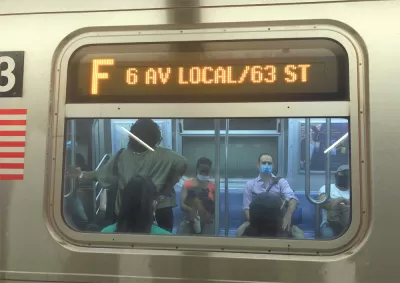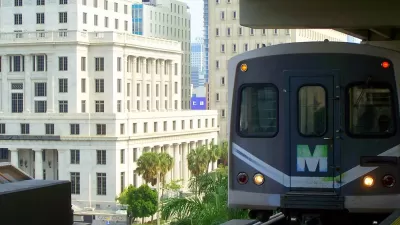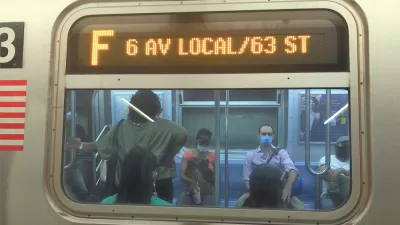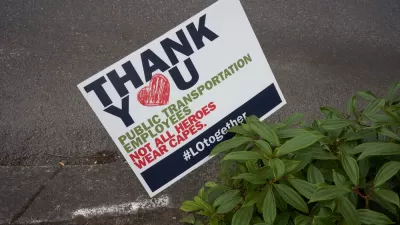The federal funding for public transit systems created by the CARES Act followed the normal federal funding formulas, which don't adequately respond to the realities of the pandemic, according to TransitCenter.

An article by TransitCenter details the growing risk that the pandemic's ongoing effects on transit ridership in the United States will have a long-term effect on transit systems.
The longer the COVID-19 pandemic grinds on, the more the inadequacy of the CARES Act and the old funding formulas it’s based on becomes apparent. As CARES funding is depleted, millions of Americans face the prospect of being unable to reach work, school, medical care, and other daily necessities because transit agencies will be forced to cut service and raise fares. Black, brown, and low-income workers use transit the most, and they will be hardest hit in any austerity scenario.
Transit systems in New York, San Francisco, Denver, and Seattle are threatening (also documented by Planetizen) deep cuts to transit service if they don't receive more emergency funding from the federal government, according to TransitCenter.
The inadequacies of CARES Act funding for transit are multiple, according to the report, and any new federal emergency funding should correct previous mistakes. "Instead of a disaster relief model, targeting assistance according to the specific impacts in affected areas, the CARES Act response to transit was grounded in outmoded equations." The result of the CARES Act funding model, according to the report, is that funding will run out for larger areas in half the time.
FULL STORY: The CARES Act Came Up Short, Now Transit Agencies Are Running Out of Time

Alabama: Trump Terminates Settlements for Black Communities Harmed By Raw Sewage
Trump deemed the landmark civil rights agreement “illegal DEI and environmental justice policy.”

Study: Maui’s Plan to Convert Vacation Rentals to Long-Term Housing Could Cause Nearly $1 Billion Economic Loss
The plan would reduce visitor accommodation by 25% resulting in 1,900 jobs lost.

Planetizen Federal Action Tracker
A weekly monitor of how Trump’s orders and actions are impacting planners and planning in America.

Restoring Northern India’s Himalayan ‘Water Temples’
Thousands of centuries-old buildings protect the region’s natural springs and serve as community wells and gathering places.

Milwaukee to Double Bike Share Stations
Bublr Bikes, one of the nation’s most successful, will add 500 new e-bikes to its system.

DC Extends Application Window for Outdoor Dining Permits
District restaurants will have until the end of November to apply, but businesses with permits in rush hour parking lanes must end operations on July 31.
Urban Design for Planners 1: Software Tools
This six-course series explores essential urban design concepts using open source software and equips planners with the tools they need to participate fully in the urban design process.
Planning for Universal Design
Learn the tools for implementing Universal Design in planning regulations.
Caltrans
Smith Gee Studio
Institute for Housing and Urban Development Studies (IHS)
City of Grandview
Harvard GSD Executive Education
Toledo-Lucas County Plan Commissions
Salt Lake City
NYU Wagner Graduate School of Public Service





























